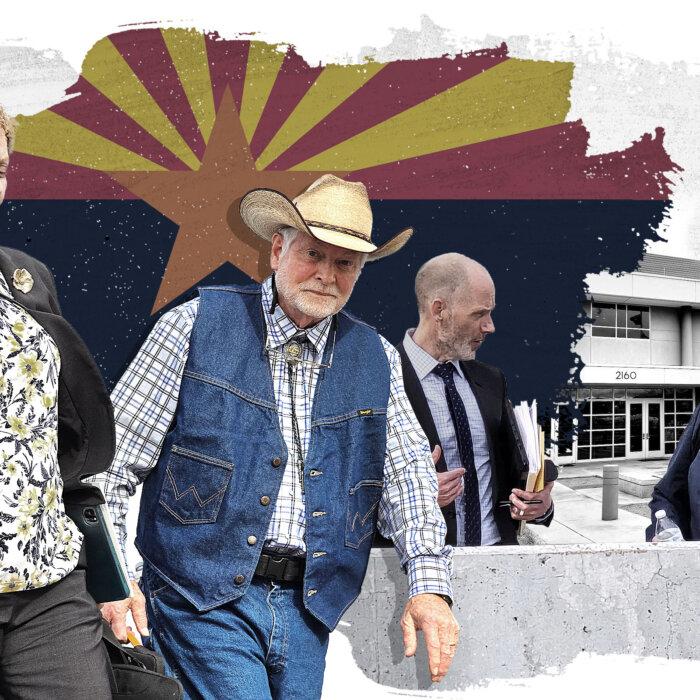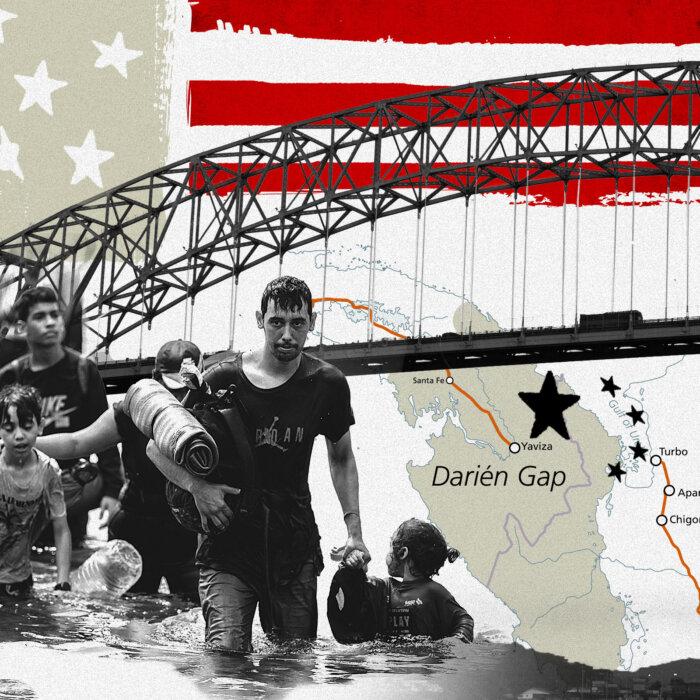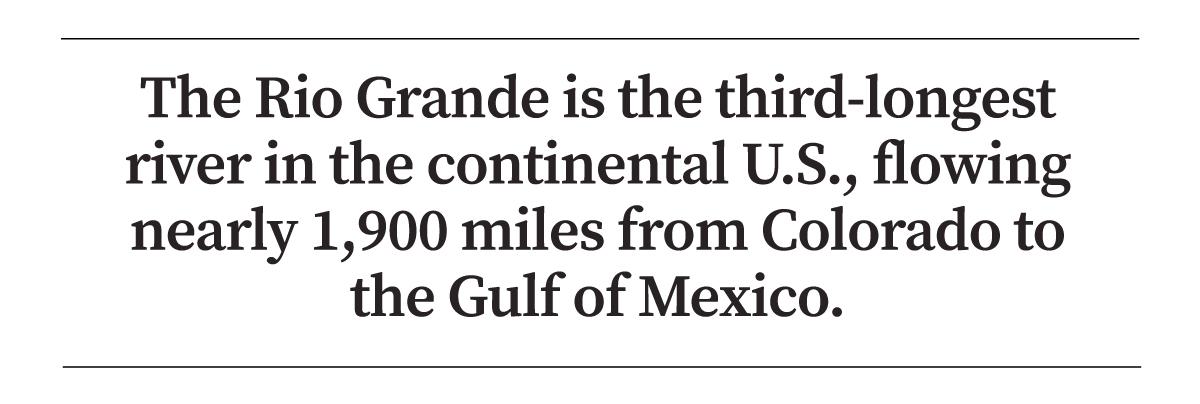EAGLE PASS, Texas—Mass illegal immigration is pushing rescue crews in this small Texas border town close to their breaking point.
The mighty Rio Grande has become a river of misery for Eagle Pass Fire Chief Manuel Mello III and his 52 first responders.
His medics sometimes confide: “Chief, I’m sick and tired of going out to the river and pulling bodies out,” Chief Mello told The Epoch Times, as he described how much the border crisis is affecting his department’s rescue workers.
They are grappling with record numbers of drowned men, women, and children who perish while crossing the river from Mexico into the United States.
The chief’s crews are risking their lives in nightmarish scenarios with unidentified people who are sick, hurt, or dead—not just along the river, but also on nearby roads, ranches, and railways.
They are responding to immigration-related emergencies so frequently that legal residents of their own community may be left waiting for medical care.
“There are days it seems that the ambulance wails never stop,” the chief told a congressional committee recently, noting that many of those ambulances are headed toward the Rio Grande and its surrounding area.
People in the community hear those sirens. Some see the bodies washed up along the riverbank. And they feel the impact.
“It breaks my heart to know that there are children drowning in the river; there are people on the way over here being raped and being robbed,” Eagle Pass resident Ruben Camarillo, a 35-year-old father of a 9-year-old son, said.
As he stood on a city street corner in support of former President Donald Trump’s recent border-focused visit to Eagle Pass, Mr. Camarillo told The Epoch Times that illegal immigration is “causing so much death and destruction … and we’re experiencing that firsthand.”
Rescuers Need Assistance
The Eagle Pass Fire Department is getting little, if any, help from the federal government to ease burdens stemming from the nation’s border crisis, Chief Mello said.
He’s seeking funds to cover costs from hundreds of ambulance runs carrying illegal aliens. He also is trying to secure counseling for first responders who are coping with stress and trauma that linger long after they go off duty.
While dealing with death is an accepted part of an emergency responder’s job, Eagle Pass medics are overdosing on gruesome encounters that are rare occurrences elsewhere—such as drowned children.
“The mental impact will take a long time to heal if we do not get help for them soon,” the chief told federal lawmakers.
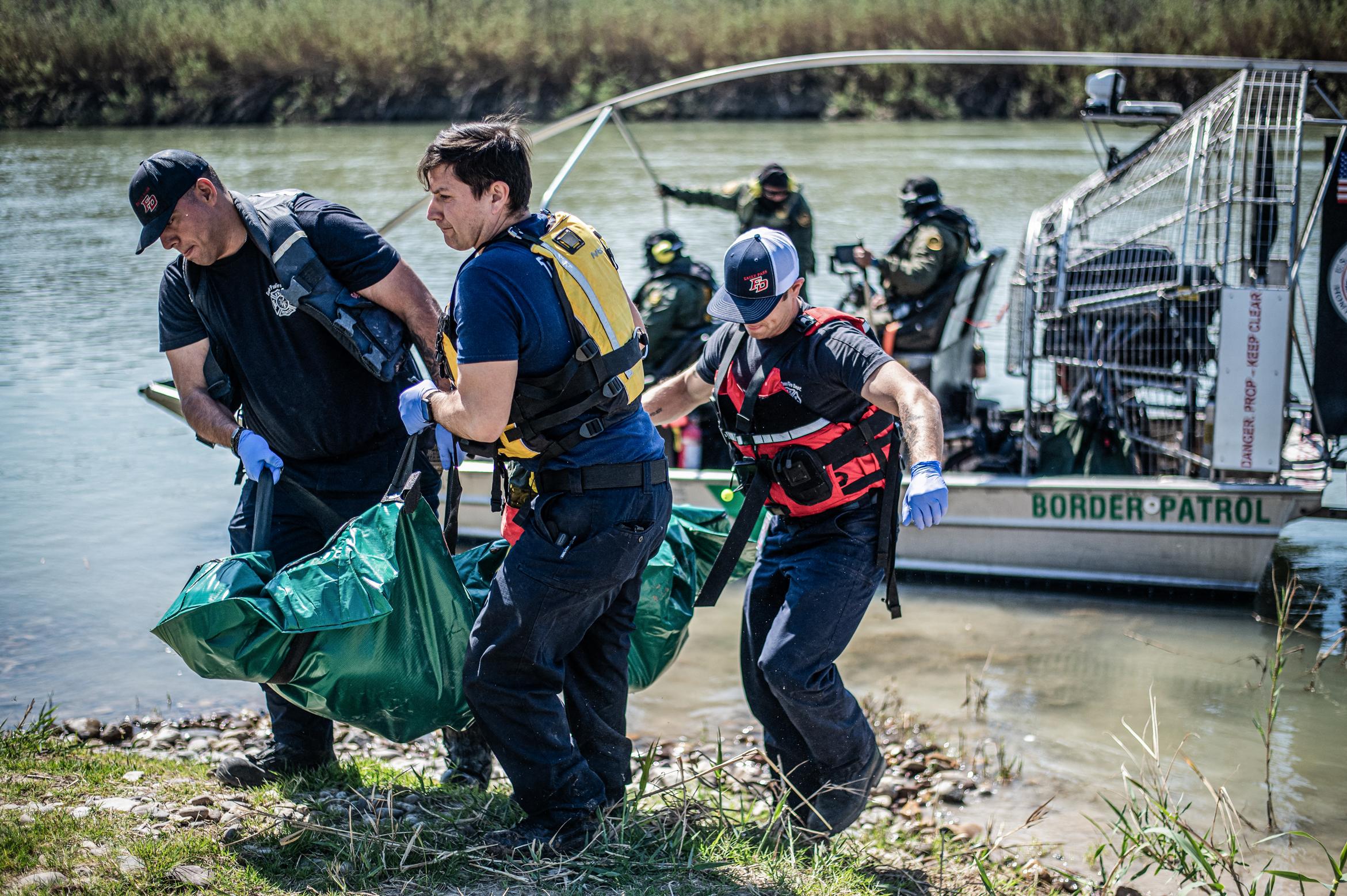
(L–R) Firefighters Rodrigo Pineda, William Dorsey, and Lt. Julio Valdes of the Eagle Pass Fire Department recover a body from the Rio Grande river in Eagle Pass, Texas, on March 1, 2024. (Sergio Flores/AFP via Getty Images)
Above all, Chief Mello would like to see U.S. leaders stem the tide of illegal immigrants. That would be much better than throwing money at the consequences, he said.
“There needs to be some unity within the federal government so we can actually stop it,” the chief said.
In hopes that the right people finally hear—and heed—his pleas, Chief Mello shared his story with Congress in brief testimony earlier this year. He also gave a two-hour interview to The Epoch Times about the challenges that his department faces.
But the chief also emphasized that the problems extend beyond Eagle Pass. “It’s not just me with this issue,” Chief Mello said. “It’s every single fire department along the border.”
‘Epicenter’ of Crisis
Still, Eagle Pass arguably has been affected more than the average border town.
“At points, we have had 1,500 people crossing [the Rio Grande] at one time,” Chief Mello said. One evening, 2,000 people were lined up, waiting to be transferred to a U.S. Border Patrol processing station; by the next morning, the line had grown to 4,000.

Illegal border crossings during the Biden administration have surpassed the 9 million mark, mostly at the U.S.–Mexico border, according to Customs and Border Protection data.
Because of the recent surges, Eagle Pass has been in the national spotlight frequently.
Sometimes called “the epicenter of the border crisis,” the city has been the site of a standoff between state and federal government agencies. They are clashing over approaches to illegal immigration, just as the two leading presidential candidates do.
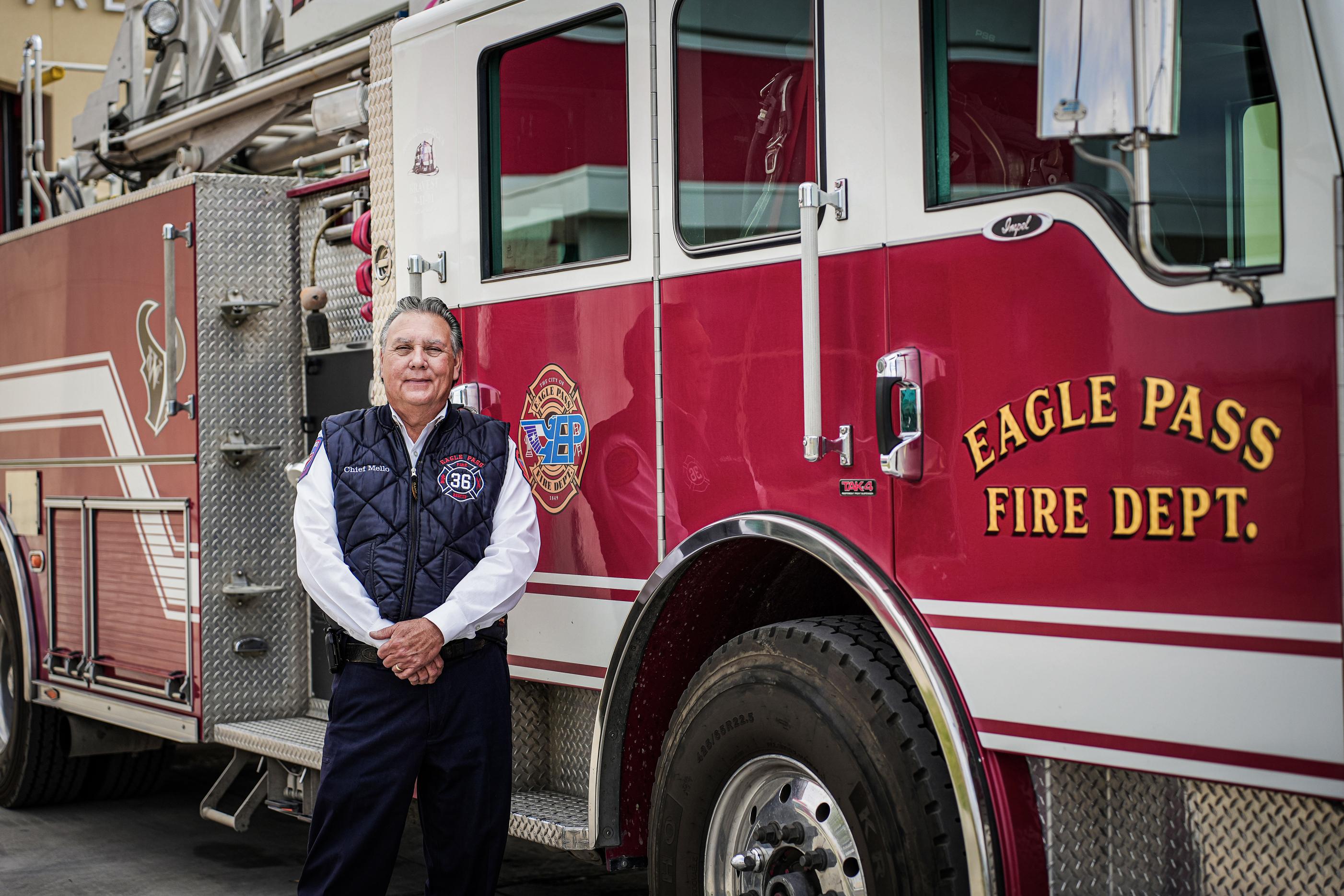
Eagle Pass Fire Chief Manual Mello stands in front of a fire truck in Eagle Pass, Texas, on Feb. 29, 2024. (Charlotte Cuthbertson/The Epoch Times)
While President Trump advocates a crackdown on illegal immigration, President Biden has embraced a more “welcoming” approach and loosened restrictions.
But the crisis has escalated so much that “even some of Biden’s fellow Democrats have begun advocating for more stringent border control,” the Migration Policy Institute noted.
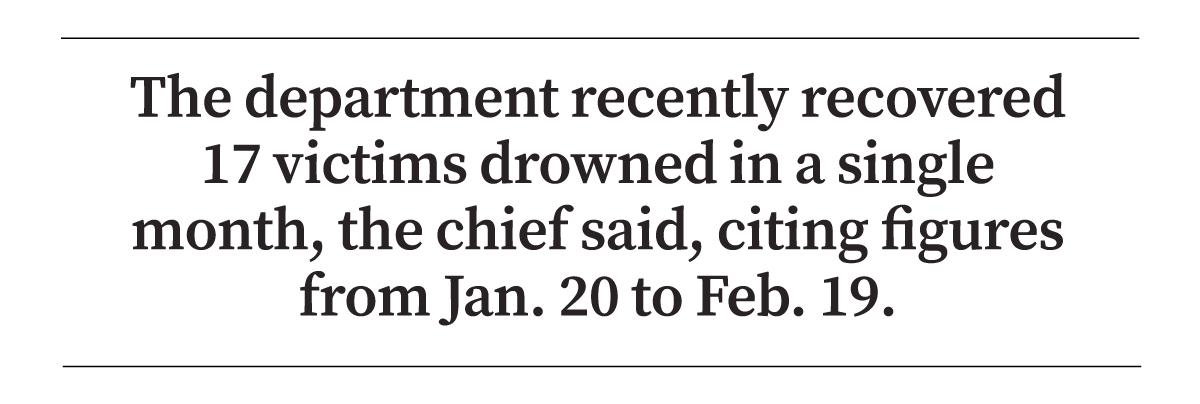
One Month, 17 Drownings
When Chief Mello first joined the fire department in 1992, the Rio Grande’s strong currents would snatch about six lives a year.
But the department recently recovered 17 victims drowned in a single month, the chief said, citing figures from Jan. 20 to Feb. 19.
That’s a record high during Chief Mello’s 32-year career, which includes a decade as chief. And it excludes drowning victims that the Border Patrol or other agencies picked up.
“These past couple of years, we have been going to the river, basically almost every day—sometimes three, four times a day—for drownings; for body recovery,” Chief Mello said.
The casualty count has fluctuated over the years, but before 2021, the annual number of drownings was a dozen or fewer.
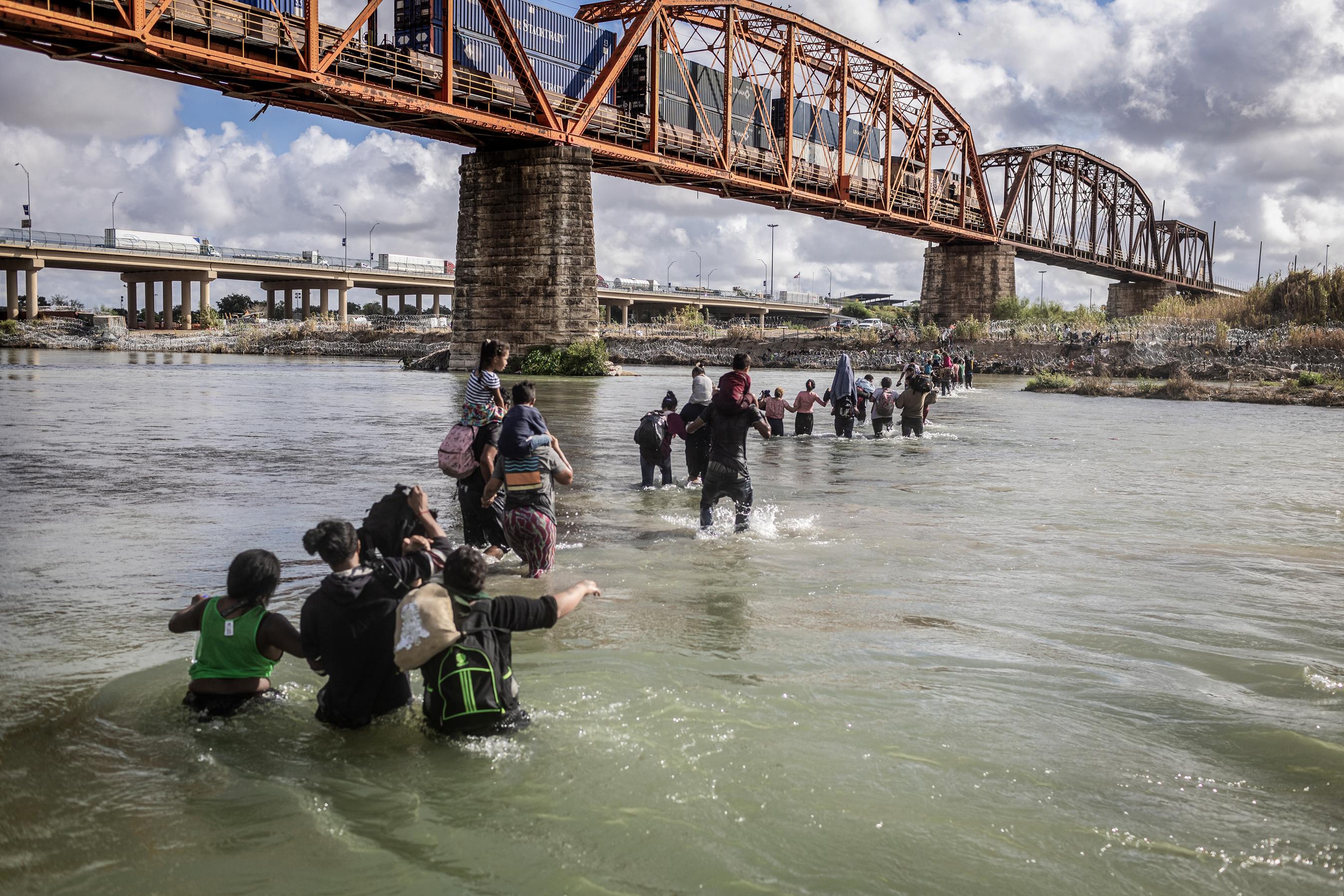
Illegal immigrants cross the Rio Grande from Mexico into the United States in Eagle Pass, Texas, on Sept. 30, 2023. (John Moore/Getty Images)
However, according to Chief Mello, in 2023, his crews retrieved 43 bodies from the Rio Grande; the youngest was a 2-month-old infant.
“I’ve seen 5-year-olds, 10-year-olds, when they’re pulled out of the river, their lifeless bodies,” the chief said, his brow furrowing.
Those images are seared in his mind. “It’s something that never goes away,” he said.
Most first responders in his department are “young guys,” many of whom are fathers of children who are about the same ages as the drowning victims, Chief Mello said.
Picturing their own children as they attend to the deceased or imperiled youngsters, these tough men are sometimes reduced to tears. The chief, too, has wept. A mixture of sadness and anger spills out.
“You get sad because of what they’ve been through,” he said, “but you also go through the anger.”
That’s because, encouraged by some government leaders, the illegal immigrants keep coming despite the risks to them and their children.
Sometimes crews spot migrants preparing to cross the river and shout warnings from the riverbank. “You’re telling them, ‘Go back, go back,’ because we know that it’s dangerous,” Chief Mello said. “But then you see them tying their children down.”
Shaking his head at the thought, the chief said he has seen adults strap children onto them, using ropes or rags, “and then they walk into the river.”
“Then you can see that little baby, going up and down, bobbing for air every time they go up and down,” he said. “And that’s very sad.”
For those who survive crossing the Rio Grande, “You see the mom and dad crying, because they’ve made that trek and now that they’re on U.S. soil,” the chief said.
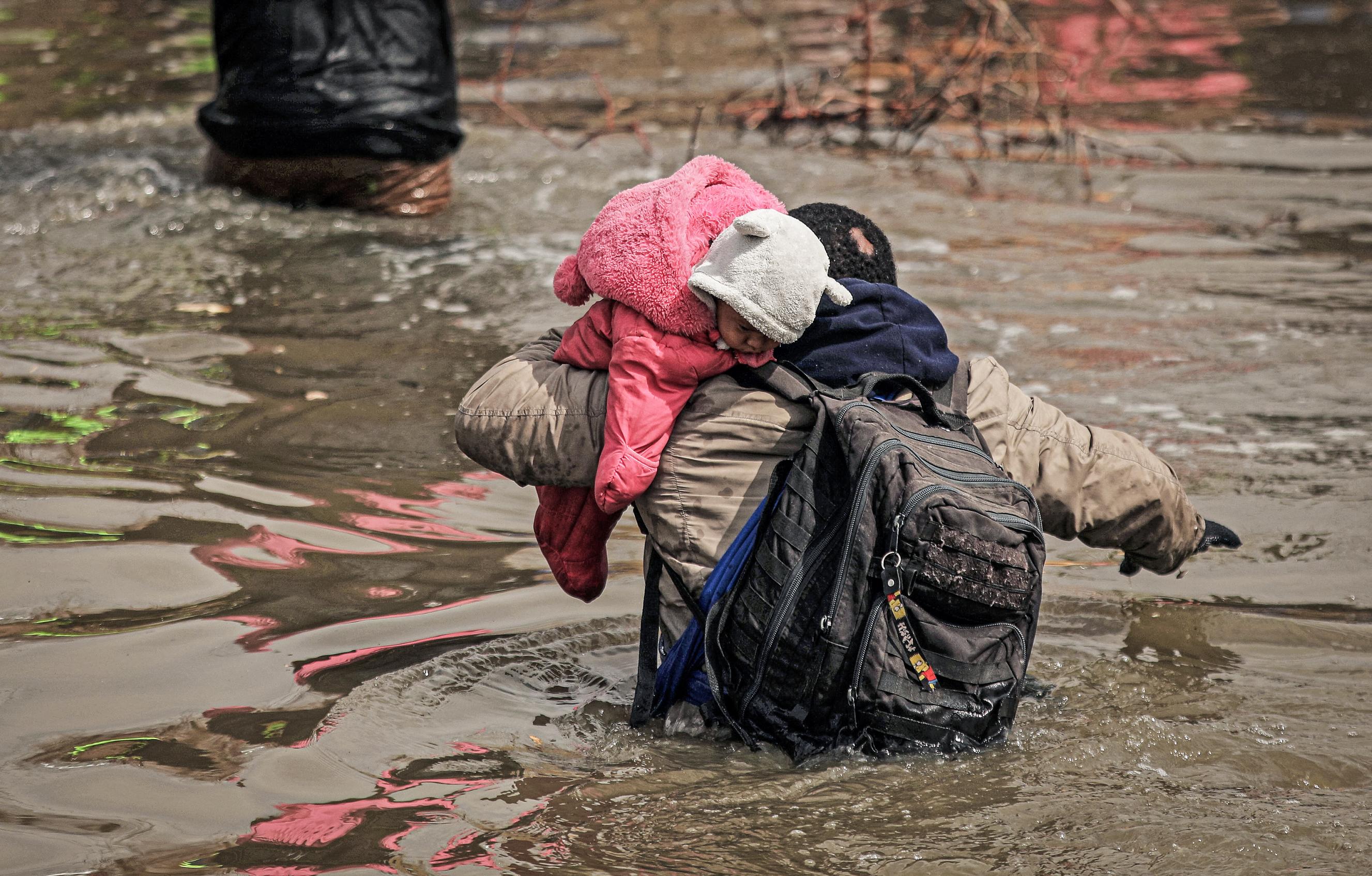
Illegal immigrants cross the Rio Grande from Ciudad Juarez, Mexico, to El Paso, Texas, on Feb. 29, 2024. (Herika Martinez/AFP via Getty Images)
Why Eagle Pass?
To some degree, Eagle Pass’s unique characteristics make it a hotspot for illegal aliens.
The city is located directly across from one of the “safest” areas of northern Mexico, one that migrants consider a “smoother path” into the United States, the chief said.
Located about 140 miles southwest of San Antonio, Eagle Pass is also home to one of the United States’ busiest rail-crossing areas. Illegal immigrants “hop into the rail cars coming from Mexico,” the chief said. “It’s like having a free ride.”
And then there’s the 30-mile stretch of the Rio Grande that Eagle Pass shares with its Mexican sister city, Piedras Negras.
The Rio Grande’s name translates to “big river;” and Chief Mello calls it a “precious” one because of its significance as a natural resource.
As the third-longest river in the contiguous United States, flowing nearly 1,900 miles from Colorado to the Gulf of Mexico, it supplies life-sustaining water for animals, people, and more than 2 million acres of cropland.
But it also churns out tragedies that have smacked Chief Mello and his medics in the face with shocking regularity lately, “almost daily.”
Twelve of the department’s 52 members are cross-trained in swift-water rescue. Sometimes, they’re called to drownings-in-progress.
However, these specially trained rescuers were able to save only about four or five near-drownings in the past year.
“By the time we get there, they’ve been underwater for a while,” the chief said. “I doubt any fire department right now is going through what we’re going through.”
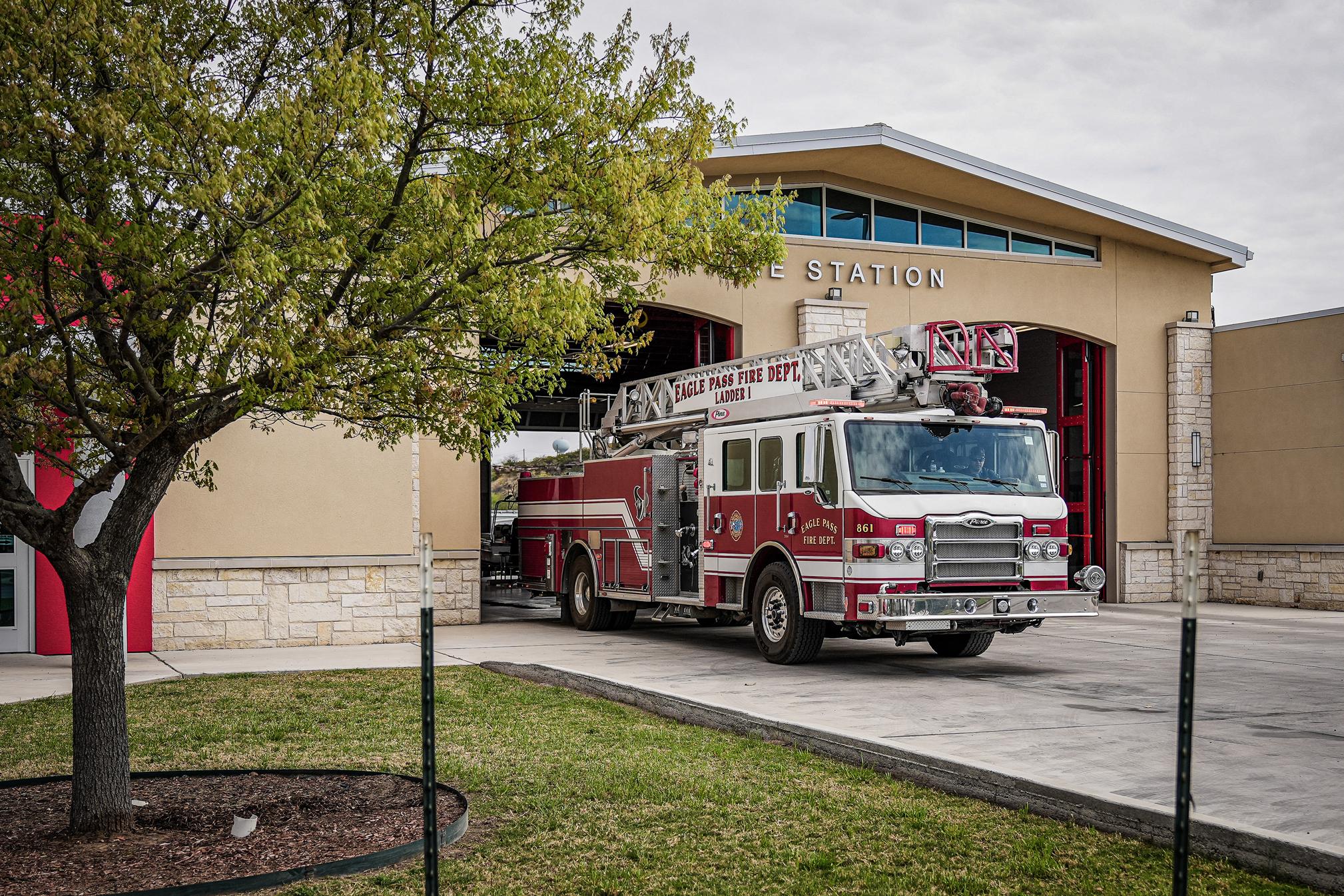
The main fire station in Eagle Pass, Texas, on Feb. 29, 2024. (Charlotte Cuthbertson/The Epoch Times)
Two Little Boys
On Jan. 11, just before the record-shattering month of drownings began, Chief Mello told a congressional committee about the toll that the border crisis is taking on his department.
“As a witness to many incidents, I am here to tell you that we are being overwhelmed with EMS [emergency medical services] calls and body recoveries,” he testified.
In the Border Patrol’s Del Rio Sector, which includes Eagle Pass, agents apprehended nearly 53,000 illegal immigrants in August 2022—the same month that Chief Mello’s crews dealt with a pair of heart-wrenching deaths, back-to-back.
He shared details of that tragedy with the congressional committee, to give its members “an idea of what my men and women are going through.”
On Aug. 22, 2022, dispatchers sent the department’s swift-water rescue crew and an ambulance to one of the two international bridges that span the Rio Grande in Eagle Pass.
There, they found Border Patrol agents performing CPR on a 3-month-old boy who had been pulled from the river. Their efforts restored a faint pulse, and crews whisked the infant to a hospital.
Moments later, a second call for help originated from the same area, reporting a 3-year-old male victim. At first, medics thought this was a duplicate call for the same incident. They wondered: Were callers mistakenly talking about a 3-year-old when they meant to describe a 3-month-old?
But there was no mistake; a second child was indeed needing help. Others had already tried to revive the boy, who had been submerged for quite some time. “He died right there in the back of that pickup truck,” the chief recounted to The Epoch Times.
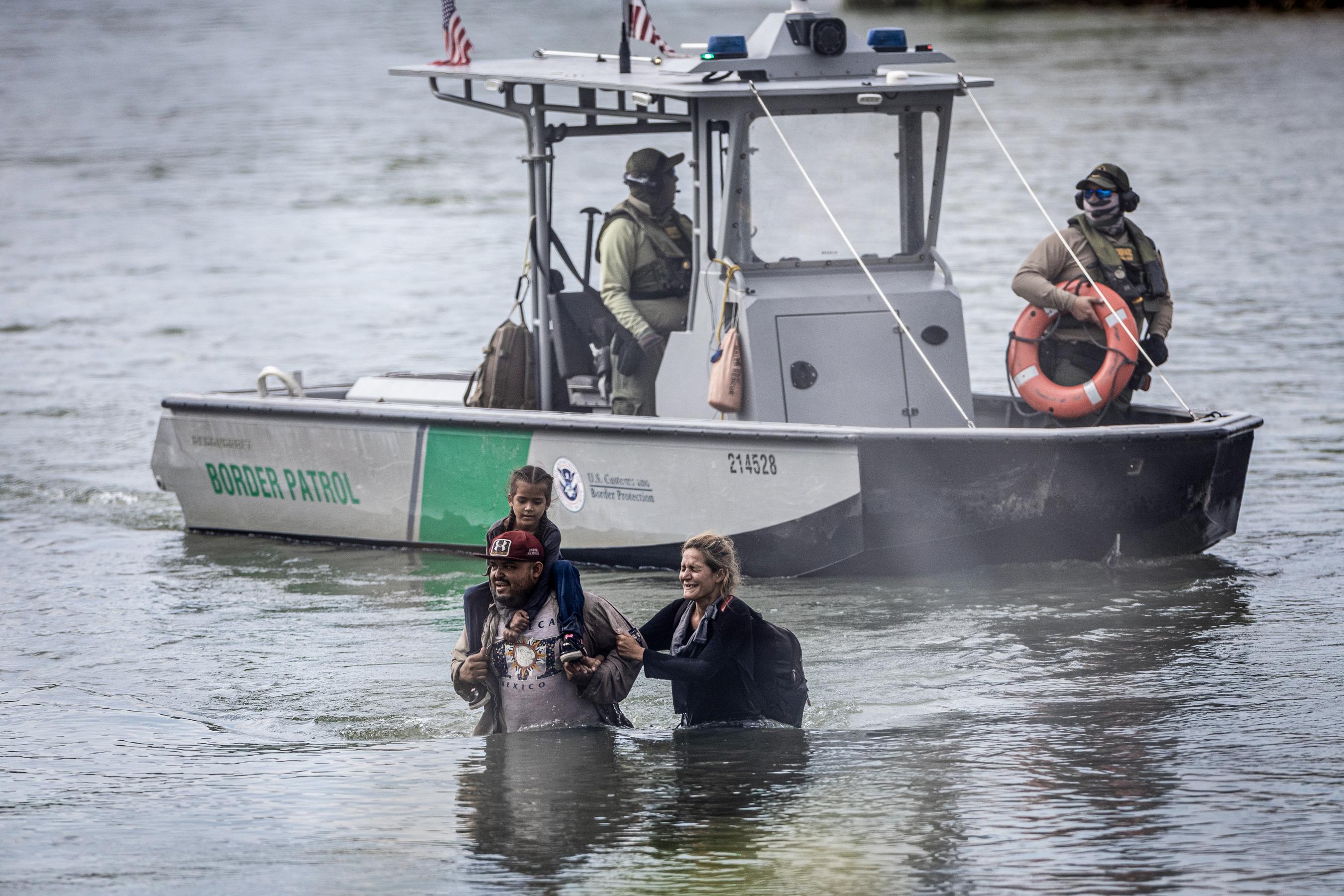
Illegal immigrants wade through the Rio Grande from Mexico into the United States in Eagle Pass, Texas, on Sept. 27, 2023. (John Moore/Getty Images)
Both boys died. And these weren’t two random little boys. They were brothers—a realization that made a sad situation even sadder, the chief said.
He found out that the brothers had come from Nicaragua, but the chief has no idea how they made the journey of some 1,600 miles from their home. He also doesn’t know the fate of their mother, who was apparently traveling with them.
But he did learn that the boys most likely died because their mother lost her grip on the children, as many river-crossers do.
He explained that migrants often meet their demise when the Rio Grande lulls them into complacency. But most people are unaware of the river’s quirks.
“There are areas where you’re walking, the water is maybe knee-deep,” the chief said. People mistakenly believe that “because they’re walking on a sandbar, that the whole river’s going to be shallow, and it’s not,” he said.
Suddenly, the riverbed drops, plunging a person up to 15 feet underwater, the chief said. If that person is weighted down with a backpack, other belongings, or a child, there’s little chance of emerging alive.
“This river is very treacherous,” the chief said. “The currents are very swift; there’s some undertow. … and they just can’t make it out.”
Congress Members React
After hearing Chief Mello’s testimony, Rep. Sheila Jackson Lee (D-Texas) said she sensed the emotion in his voice. Stating that she also has long championed the causes of firefighters, she looked directly at Chief Mello and declared, “I am committed to getting you dollars.”
Ms. Jackson Lee’s office didn’t respond to The Epoch Times’ request for an update on her efforts since that Jan. 11 hearing.
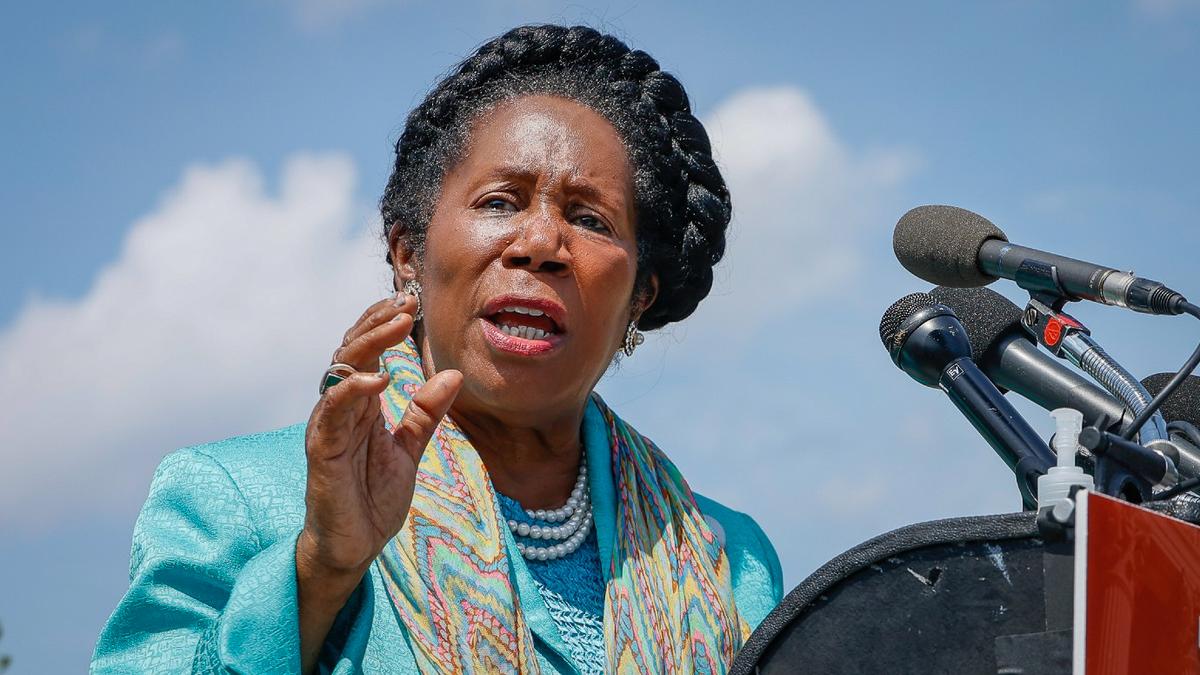
During the hearing, Rep. Tom McClintock (R-Calif.) said: “This unprecedented illegal migration is exactly what the Democrats promised to do. It’s exactly what they have done. And it’s exactly what they have defended for the last three years in this Congress; if you voted for them, this is exactly what you voted for.”
He suggested that Democrats are welcoming illegal immigrants, yet most of those supporters have no idea as to the perils that those immigrants will face en route to the United States.
“When we pick them up, they regret making that trek,” Chief Mello said.
The chief wrapped up his remarks by telling the congress members that he sees an enormous cost “of not being a normal community.”
“We’re being overwhelmed,” the chief testified. “One thing I can say is: It needs to stop.”
Beyond the Drownings
Mingled with the drownings, Eagle Pass crews sometimes find bodies of people who have suffered gunshot wounds to the head—apparently executed, perhaps by a Mexican drug cartel or gang, and then dumped into the Rio Grande, the chief said.
Chief Mello’s crews also treat illegal immigrants for all types of other medical complaints. He rattled off some examples: hypothermia, weakness, shortness of breath, fainting, headaches, fever, flu-like symptoms, allergic reactions, abdominal pains, pregnancy.
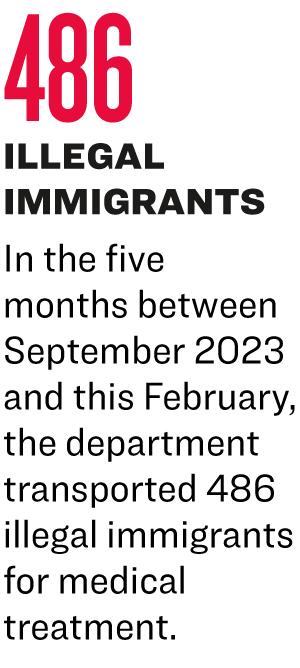
“We transport patients almost every day” from the river’s edge or from nearby areas, he said.
In the five months between September 2023 and February, the department transported 486 illegal immigrants for medical treatment. Each of those ambulance runs costs at least $900, excluding medications and additional treatments.
The ambulance bill is normally sent to health insurance companies or patients. “But since these are undocumented people, who do you send the invoice to?” the chief asked.
As a result, just for that short span, Chief Mello’s department absorbed a loss of $437,400. That stings in a department that has a total annual budget of $6 million.
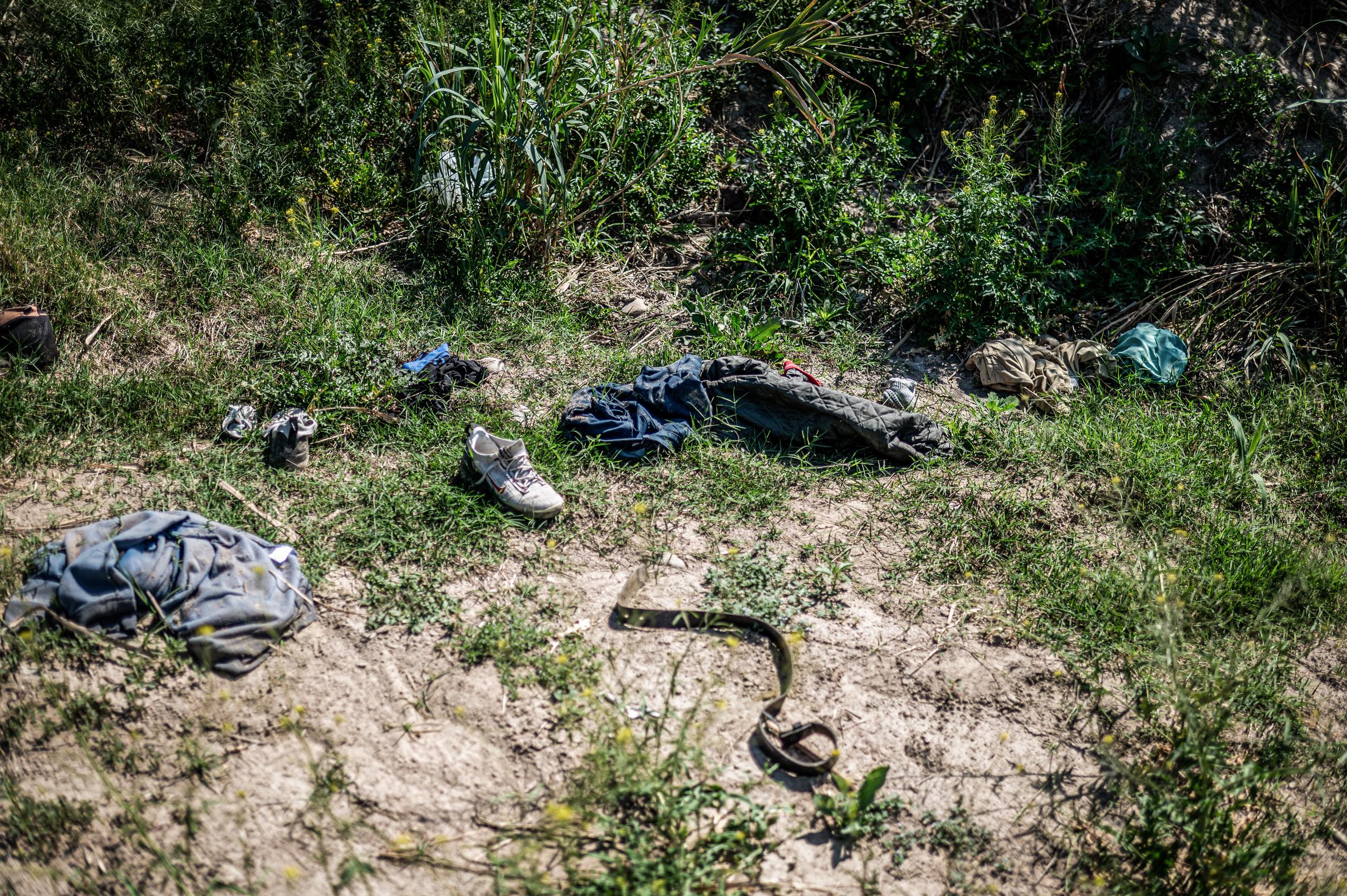
Clothes left behind by illegal immigrants are strewn near the Rio Grande in Eagle Pass, Texas, on March 1, 2024. (Sergio Flores/AFP via Getty Images)
From its three fire stations, the Eagle Pass Fire Department handles emergency calls for all of Maverick County, where Eagle Pass is the county seat. On any given day, including “visitors,” the population is about 70,000.
Last year, the department handled 9,500 calls for emergency medical help; 10 percent of them were illegal immigrant-related. Chief Mello had to add a fifth ambulance and crew, dedicated solely to assisting illegal immigrants.
To defray some of the costs, the state of Texas gave the department $400,000 for overtime. But the department spent almost all of that in just three months.
All of the patients—illegal immigrants and citizens alike—go to the region’s only hospital, Fort Duncan Regional Medical Center. Only 18 emergency beds are available.
“That can be overwhelmed very quickly,” the chief said, particularly because Eagle Pass is a low-income community with many residents who use the hospital as a de facto doctor’s office.
At peak times, some people who transported themselves to the hospital have waited three or four hours for treatment, Chief Mello said.
Sometimes, ambulances loaded with patients have waited anywhere from 30 minutes to two hours “just to get a bed,” he said.
These statistics and stories only hint at the suffering that illegal immigration causes, the chief said.
He suspects that some of the groups that claim to be families “aren’t really families,” and that the children don’t really belong to those adults; he worries that those kids could be victims of sex trafficking.
Chief Mello wonders about the motives of the many military-age males who traveled here solo.
He is haunted by dozens of deaths that he cannot forget, in addition to the drownings.
“What about the people that have died in the brush? What about the people that died in the deer blind, because they froze to death? We found them hugging each other because they were cold, but they were dead,” the chief said.
“What about the people that we pulled out of the rail cars that suffocated because of the heat, the people that got run over by vehicles out on the highway?”
And one time, a smuggler’s pickup truck overturned, leaving 11 people hurt and one killed.
Some of the images are so grisly, “you just can’t imagine,” Chief Mello said, shuddering.
He noted, with gallows humor, that public safety trainers have jokingly likened Eagle Pass to a “paramedic heaven,” because rescuers’ skills are put to the test in so many ways, with such frequency.
“But,” the chief said, grimly, “it’s more like hell than heaven right now.”
Original News Source Link – Epoch Times
Running For Office? Conservative Campaign Consulting – Election Day Strategies!


